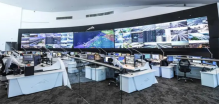They will demonstrate how the autonomous robo-taxi could stage and deploy robotic delivery dogs that could deliver packages to a consumer, providing “seamless mobility that extends right to your doorstep.”
It is part of Continental’s vision to create an efficient transport team of driverless vehicles and delivery robots which will facilitate the growing market for goods and parcel delivery to residential areas. The CUbE pod can carry one or multiple delivery robots and deploy them to handle the last yards of the goods and parcel delivery logistics chain - which could become a feature of smart cities in the future.
An autonomous shuttle will be paired with a delivery robot in a residential setting at their CES booth as part of their demonstration.
“Both are electrified, both are autonomous and, in principle, both can be based on the same scalable technology portfolio. These synergies create an exciting potential for holistic delivery concepts using similar solutions for different platforms. Beyond this technology foundation, it’s reasonable to expect a whole value chain to develop in this area,” said Ralph Lauxmann, head of systems and technology, chassis and safety division, Continental.
Market estimations shows that the need to transport goods will outpace the strongly growing need for people transport in densely populated areas. There will be peaks in demand for driverless vehicles during the day and to make use of such vehicles outside those peak rush hours is where robot-delivery comes in.
Continental views automated goods delivery as an integral part of future urban mobility as an addition to conventional goods delivery.
“Industrialising the automation of goods delivery requires reliable, robust, high-performing and best-cost technology – a mix perfectly reflected in the automotive equivalent of automation,” Lauxmann added.


















